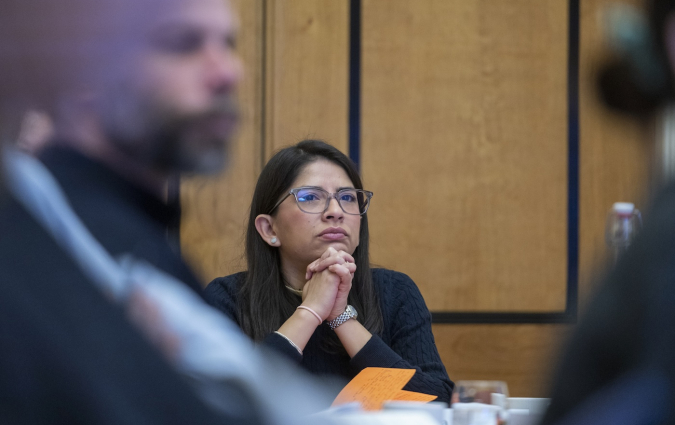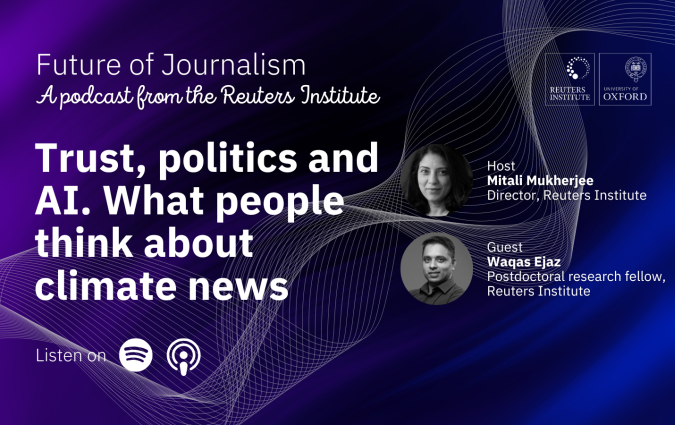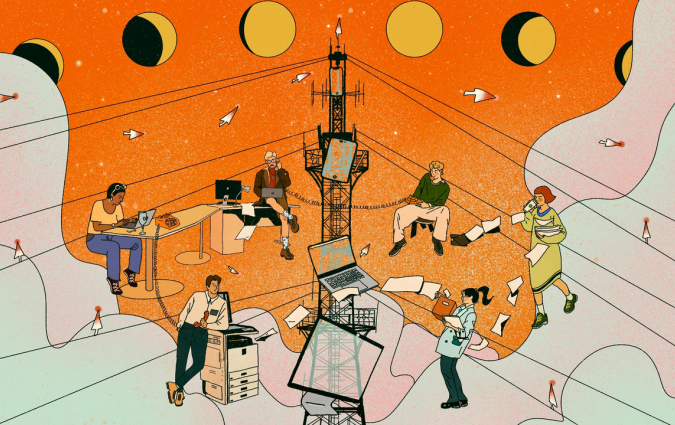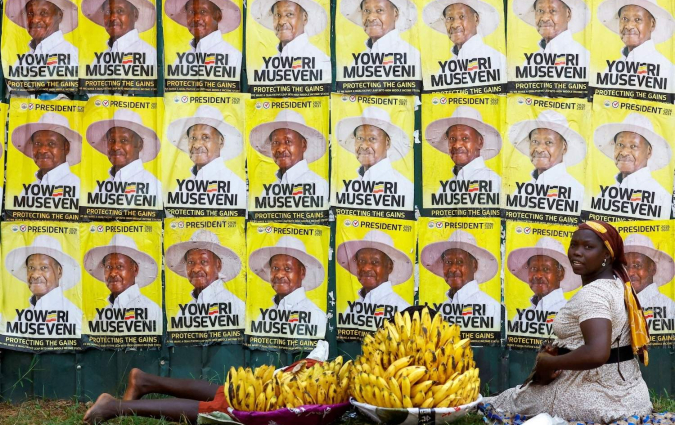Our podcast: What's the point of opinion journalism in the digital age?

Image: Canva / DisobeyArt
The topic
In this episode of our Future of Journalism podcast we look at the role of opinion writing within journalism in a world where many of us have many different ways of expressing our opinions and reading others' opinions, including on social media. We explore what makes good opinion journalism, the benefit to publishers and what progress needs to be made to ensure a diversity of opinions are heard.
Speakers
Karen Attiah is an award-winning Washington Post columnist, writing on international affairs, culture, and human rights issues. She worked previously at the Associated Press before joining the Post in 2014, first as a Digital Producer and later as Global Opinions Editor.
Rasmus Nielsen is co-author of the Digital News Report and Director of the Reuters Institute and Professor of Political Communication at the University of Oxford. His work focuses on changes in the news media, political communication, and the role of digital technologies in both.
The podcast
Listen on Spotify | Apple | Google
The transcript
The difference between opinion journalism and news reporting ↑
Rasmus: If a reader asked you to explain the difference between opinion journalism and news reporting, how would you respond to that question?
Karen: Yeah, it’s a good question and I think one that we, within our industry, need to remind ourselves of. So from a very basic standpoint, news journalism often is supposed to be unbiased, it’s supposed to take in all of the different sides of a particular issue, and the reporter or writer isn’t supposed to clearly have a bias, or an opinion, or make value judgements on the information that they’re reporting. Often their job is to collect the opinions, and the viewpoints, and the analysis of others, and then put that together to basically, answer the questions of who, what, when, where, why, and all of that.
It’s others jobs to perhaps interpret what that news story, or negative information, or that new developments means in a broader context. But at a very nuts and bolts basic level, I think that’s what news reporting is. So when it comes to opinion journalism, I think opinion journalism – we are in that sphere, we are building upon what the news gathering is, and we see the news gathering, and then we have more freedom to put that into a broader context, right.
A reporter reports – “Man bites dog” – and that is just the facts, there is no value judgement about it – on the opinion journalism side we might say, “Man bites dog again, but here’s why this matters, or here’s why this doesn’t matter, or here’s why the increased rates of men biting dogs is why our society is about to collapse and the apocalypse” – you know what I mean, so that’s way beyond the bounds of what a news reporter is supposed to do.
So I think at a very basic level, reporters gather the news, curate it – they do frame it in a way but again, the personal judgement, the value judgements, the moral judgements by the author, by the reporter are left out, and opinion journalists are able to again, build off of that news gathering, and then add judgements, framing, context, illumination, and perhaps push it forward.
And give the space to even ask more questions perhaps, to build on that, but I believe that solid opinion journalism is built on solid news gathering, I think the two feed off of each other and we, as opinion journalists, couldn’t do what we do if it wasn’t for great news reporting.
Journalistic values and opinion journalism ↑
Rasmus: Would it be fair to say that – what you describe is in part opinion writers doing the things that news reporters might turn to sources for, provide analysis that interprets the events of the day, provide moral judgement of the events of the day. That in a sense, these are journalists who are taking on a role that news reporters primarily would ask sources to place.
Karen: Yeah, I think that’s in some cases true, and news reporters are often turning to experts, to academics, to doctors, to specialists, to get their interpretation. Now I think what is interesting about opinion journalism today is that there is more space for even those experts, or academics, or analysts, to be able to more broadly explain their views, rather than just being reduced to a line or two in a quote, in a piece, right.
And also – and I think this is one thing that people tend to not appreciate, or understand – very often opinion journalists, particularly – I mean at The Washington Post, very often we were reporters, we do know how to gather information as well, and often we come to journalism – we’ve had our beats, we’ve had our news reporting beats, and often that’s how, over time, we’ve built up other sources and the networks.
And we’re not claiming expertise, at the end of the day, we are writers, but we do, over time, build up a certain well of knowledge in our particular areas of interest that we do draw upon. So this idea that opinion journalism – good opinion journalism, I’ll say, good opinion journalism also has an element of reporting – I do reporting for my columns.
My colleague – Catherine Rampell is a great reporter for The New York Times, and often, you see in her columns writing on the economy, that she is reporting and going out and seeking facts as well. It’s just that we are given the space to be able to organise the information differently, reframe, and add voice, add style, add frankly, a bit of personality perhaps. And then sometimes to make things a bit more human and relatable, so that people can digest the news a little easier.
News publishers and opinion journalism↑
Rasmus: I think it would be really interesting to hear a bit more from you on one of the things you just highlighted, which is that with social media, with blogs and personal websites, with a bewildering array of newsletters, including from people who aren’t themselves journalists, but experts or other individuals. It sounds like a lot of what you describe opinion journalism offering is being offered in abundance by many other actors, including actors that journalists would often turn to as sources.
Whether because they’re experts, whether because they are authoritative institutions, whether they are people who have lived experience, and who are narrating that, and sharing that in public. If there is such an abundance of opinion, and so many different ways to share opinions and analysis with wide audiences, what is the value of opinion for news publishers specifically? Why would organisations that I think, often are committed to the idea of seeking truth and reporting it as the core of their identity and their purpose in the world – why is it important that they specifically invest also in opinion journalism?
Karen: Yeah look, one thing people have to realise in general, is that look, we are selling a product, we are a business, and opinion journalism is part of the journalism information product that an institution like the Post, or the Times is offering. I think that opinion journalism, again going back to the fact that I think great opinion journalism is often based on reporting, is based on still talking to people, still based on getting as close to the story as possible.
That there is an element of – what institutions provide is that I can say, well my story – my institution, first of all, gives me the financial runway to be able to do the reporting, to be able to – I have editors, copy editors, lines of basically quality control, that perhaps a lone blogger on a platform who’s also having to churn out a whole bunch of pieces, doesn’t have, two, or three, or four, or five different pairs of eyes on a particular piece, just doesn’t have.
So, I think part of what we’re offering is saying, “Look, we see this one opinion piece, and yes maybe it has my by-line on it, but really in reality maybe six people’s labour has gone into that. So, you can expect that there’s a certain level of quality in that, and I think that’s also true for news reporting as well, and so that is the advantage to being with a large institution.
Now, that said, I mean I think it’s also just a part of being part of a larger team helps you to sharpen your arguments – I see a lot of lazy, mediocre writing and thoughts, and plenty of scandals honestly, where people just say, “You know what, did anybody else look at that, who did they think would think that that was a good idea before hitting click, and publish?”
And you see a lot of that, I think a lot of that is probably why a lot of people start to lump us all in with that group, but honestly, I mean I think for me, one huge, huge, huge, huge advantage, and benefit, and frankly privilege that I recognise I have, is that there is so much that goes behind the scenes of making an opinion piece.
I’m constantly checked on my facts, checked on my sources, checked on "is this a fair characterisation?", "is this fair language to use?" and being able to bat those ideas around. So, I again, would say – I think maybe perhaps institutions maybe – I’ve talked about this with other colleagues who are kind of in the opinion journalism industry, perhaps we could do a better job of explaining to people just like – what’s the literal value of the product that they’re getting.
I think some news organisations have started adding – not just the author's by-line, and the reporter’s by-line, but edited by, credits, some I’ve seen – I’ve seen some places that even put a price tag of how much it cost to produce X, Y, Z piece of investigative journalism. I think perhaps we could do a little more to signal just how much work goes into producing journalism, whether it’s opinion or news.
That being said, I agree, I mean it does – there is a lot of just lazy, uninformed takes out there, and I think readers – I think there could be so much more to be done with trying to educate on what makes a valuable op-ed, whether it’s a valuable piece of journalism, what makes a persuasive essay. But again, I will say that – just because something is labelled as opinion journalism, it doesn’t mean – don’t forget that like journalism is actually happening, there is fact-checking, there should be fact-checking.
There should be a clear sense that that writer, that author, has at least acknowledged, or engaged with the other side of the argument, even if they don’t agree. And but yeah, a strong point of view and a certain voice, I think, to it – and it’s not easy to do, it’s not an easy thing to do it consistently, and do it well.
The need for diversity within opinion journalism ↑
Rasmus: It’s interesting, I think one perhaps prejudiced criticism of some opinion journalism could be that it – cynically it could be interpreted as a cheap and predictable alternative to expensive and unpredictable original reporting. And that, in particular, if some of the opinion writers in a title hold very predictable points of view, that maybe align with the views of many of the core readers, that it’s an easy way to keep hard core loyal readers happy, by sort of giving them just more of the same and very few surprises and very little that would rub the readers the wrong way.
But what I hear you telling me is that really – what you see as the value here is that – unlike a sort of a situation in which, a private citizen Nielsen expresses his views online, which is entirely of his own account, and no one sort of stands by him, or invests in him, when Karen Attiah writes for The Washington Post, you know, it’s a job and you’re a professional, and you have the backing of an institution that invests in your work, and stands by your work, and has skin in the game. In the sense that – you have skin in the game in that your professional reputation is on the line, but the Post has skin in the game as well, in the sense that the Post is putting its name on what you publish – is that a fair interpretation of what you said?
Karen: Yeah absolutely, so then that leads to the bigger questions of who these institutions decide to invest in, and stand by, and I’m sure I have colleagues throughout the industry, who might not always agree with what I say. But I think the task is to – I’m on the younger side, I’m a daughter of West African immigrants, sometimes I get people who react to me and say, “I didn’t expect you to be at The Washington Post” like that I don’t "look the part," which is very often an older white male, right.
So, I think one big advantage in the opinion sphere now, is that we are seeing so many more voices that traditionally were left out – not just left out, but actively excluded from these institutions, and from these pages – whose opinions were not sought after, whose opinions were – and viewpoints, and expertise, and knowledge were disregarded.
So, I think that – I think in many ways, especially as the US we’ve seen so much over the last several years with Black Lives Matter, with more push for social justice, climate justice, I think there’s a realisation that, “Hey, maybe we’ve been listening to the wrong people for a very long time.” And, as we have here in the States, people who were looking at what’s happening with say access to reproductive health, again back to the climate.
And kind of jokingly saying, “Wow, maybe we should have been listening to women of colour this whole time” and many of us are like, “You think? All right, great, let us have the mic.” I don’t know, there’s something to be said for multiple systems falling apart, and maybe only now indigenous people, black people, people of colour, are being given the mic because things seem like they’re falling apart.
But that’s a topic for another day – but again, I think that there is value to the fact that we have frankly a bit more democracy in the sense that there is room for more voices – does it mean that the discourse is as neat and organised as perhaps it used to be, when the same gatekeepers were in charge, no – I don’t particularly see that as a horribly bad thing. I can see that the gates are opening up ever so slightly, but I think that’s better than basically having one or two groups, the same voices perhaps, dominating our discourse.
Rasmus: I mean, I think it’s quite clear for anyone who takes the historical record seriously, and has ever bothered to do content analysis, that many news media historically have been produced by affluent, privileged, white men, like myself, about affluent, privileged, white men, like myself, and for affluent, privileged, white men, like myself in much of the world.
And in case one didn’t have enough white men in all the news, then you could also turn to the opinion pages, and get another serving of the same types of voices speaking up. And I mean, I think you offer a very hopeful, but perhaps also, a quite charitable interpretation of how much that has changed. I mean, you’ve spoken publicly often about the sort of push back against, what I think you called the interpreter class, the sort of foreign correspondents, and think tankers who are tasked with explaining foreign events to white Americans, essentially.
Sharing power among all opinion writers ↑
Rasmus: How much progress do you feel that the American news industry, in this case, has made in giving the mic to other voices on the opinion pages, and the ones that are already so prominently featured in the daily news reporting?
Karen: Yeah – charitable is a good way to put it, like we have a – there is a lot of work to be done, a lot – there is still so much more to be done. And look, I think – and have said, and will keep saying – just having representation, it’s a step, but it’s not enough, I would absolutely like to see numbers of writers, of editors of colour, that represent more accurately what our national, or global demographic really is.
You know, I was speaking to somebody who is from the sort of more kind of international and diasporic community when I’m called a minority, I’m like, “Well, actually, in the scope of the world.”
But it’s about power right, it’s not about lack of intelligence, or expertise, it’s about frankly, white men holding the power and the keys to the kingdom of this discourse. So, it frankly – there’s evidence that actually in newsrooms that diversity has actually gotten worse over the last 10 to 20 years.
And so, now we’ve seen since the George Floyd protests, and all that – there have been a lot of promises, and a lot of rhetoric, a lot of restructuring, and hiring, which is great. At the same time, what needs to be seen, and what needs to happen, is that the power needs to be shared, frankly, that there needs to be white men who are willing to step back, give up power, take up a little less space.
So that those of us who also have knowledge, and also have skills and expertise, can help – and frankly, can help us do our jobs better. I don’t look at it as some sort of luxury, I don’t look at it as some sort of like nice thing to put on the brochure, I look at it – it’s a direct impact on the quality of our work. Frankly, news that’s produced only for and by like white rich men, I don’t think that’s a quality product because it doesn’t accurately serve, it doesn’t adequately serve the readership.
And to a certain extent, maybe some people are turning off their ears because they don’t see themselves represented in these pages, they don’t see people who’ve come from backgrounds, or they didn’t go to Ivy League schools. Or where they are first generation immigrants, they don’t see that, so they’re perhaps tired of the pages for a different reason than you are.
For the fact that they feel like these institutions aren’t even trying to cater to them, and so I think to an extent, that’s part of the huge problem is – in which, those of us who are in positions – I think for me, even for my writing, and my reporting, I hope that people can feel seen, those who come from perhaps the communities that I come from, and even some of the communities that I don’t come from, but that I know have been not served well.
That I hope – not that I hope, it’s my job again, kind of luxury, it’s my job to serve them as well. So, I think that that gets to a different sort of level of failures when it comes to journalism, and opinion journalism – who haven’t we served, who have we refused to serve all this time. And now that people are more aware and demanding to be served, it’s our jobs to do it.
Challenging authority through opinion journalism ↑
Rasmus: I mean, I would just say that there are reams of research that document the problems you describe, that there are many parts of the public who don’t feel represented in the news media, who don’t feel that the news media understand their lived experience, who don’t feel that the news media respects and reflects people like them, and like their communities.
And I don’t think we can say that opinion journalism is entirely innocent of that. I mean, I know that about half a century ago John Oakes, who created the first op-ed page at The New York Times wrote, that he felt the newspaper most effectively fulfils its social and civic responsibilities by challenging authority, acting independently, and inviting dissent.
I mean, I suppose a cynic might say that in practise opinion journalism sometimes end up amplifying authority, giving a platform for those who already have power, and only presents dissent within the stale repartee of predictable left/right political positions. I mean, why do you think it’s been so difficult, if it is so, for opinion journalism to sort of pursue the principles that have been put so clearly by yourself, and other generations of journalists who care about the importance of journalism – of opinion in our craft?
Karen: Yeah, I think that there’s definitely again, a culture, a sort of dogma of journalism – it’s called this idea of both sides, left/right, black/white, and that somehow we’re supposed to pretend that we’re all neutral, that we have this view from nowhere, which honestly, given the power asymmetries in between communities, between various social groups, racial groups, it’s simply the ability to be neutral, and to stand back, is a luxury that only the privileged can afford.
And I think, if we look back through history, particularly civil rights history in the US, that there is a very strong tradition, for instance, of the black press, which not only covered lynchings, civil rights leaders, movements, and the white press did not. But also, used those pages to forcefully advocate for justice, so I think when we do talk about – I think it’s very easy to talk about journalism – big J, big tent journalism, without also understanding, and disentangling that, at least, again at least in this country there has always been a tradition of – advocacy of columnists who have used their platforms to, for instance, go into communities and report on them, and then advocate for the policies that those communities that they spent time with.
So I guess, again, I think that what we do need is, first of all, is within us as an industry, to clearly elucidate the standards that we have, should have. Sometimes I find myself thinking that it seems like news reporters also have this bad sense that opinion journalism is just us, you know, waking up one day, and just having thoughts, and putting them out there.
But at least, for me and the writers that I’ve worked with, it is a rigorous, it is still a rigorous process, and we are thinking about how do we help people digest, contextualise. I think a lot of readers, a lot of people are looking to understand how they should think about the news that’s coming their way.
How they should organise their thoughts and, me personally, I can only speak for myself, I often write in a way that says, “I don’t necessarily have all the answers, what I’m doing is, I too am processing the different sides of an event, of a certain person’s statements, and trying to make sense of it, and I’m inviting you as a reader along that journey with me. Eventually we’ll all figure it out together.”
That’s just personally my style, I think we as humans want to know what other humans think, we like to get inside their brains, but I think for me, I at least can promise to people who read me that I have done the homework, I have done as much reading, as much speaking to people as I possibly can, under deadline, mind you, I think people should appreciate that, we don’t often give ourselves two to three weeks to think about what we should think about the Facebook outage that happened yesterday.
Our jobs are to try to come up with something, usually pretty quickly, but yeah, we’re all a part of this process of kind of understanding, and processing, and organising, and making sense of this world, and we’re not always going to get it right. I have had to even had to revisit my positions on certain things in the past publicly, and being able to say, “You know what, I didn’t quite look at this correctly that time, here’s how I’ve evolved with it.”
And I wish more journalists had more courage to do that. I also think I wish there was more, as you said Rasmus, quality. I wish there was more courage frankly, to go against established dogma, to really challenge authority, to not just sit and take down without critiqued criticism of what people in power say. And I count people in power as not just politicians, but frankly, I think – I don’t know, when I wrote something criticising Beyoncé, I think I got a lot of messages of people asking whether or not I was like digitally OK, because they were so afraid of her fan base that goes – and silence is criticism.
So, I think our job, again, and not just as opinion journalists, but I really am guided by the fact that our job is to hold the power to account. And I would like to see more of that instead of, I think, what we’re seeing sometimes, which is cosying to power, being adjacent to power. And I get it, it’s attractive and it’s got a particular currency in a certain way of doing things in the journalism world.
But I think our job is, as the saying goes, to afflict the comfortable, and comfort the afflicted. And I think for opinion journalism, we have a special runway to be able to say, “Yeah, this person X of importance said this, or does this” but it’s not right, it’s not true, it’s harmful, and we also have the power to say, “This afflicted person, or afflicted community deserves support, deserves more power in their own minds.”
So, I am, you have to say, kind of black and white when it comes to that in how I choose stories, I’m not interested in amplifying – just sort of lazily amplifying folks who – who already have the power, or who already have the platform. What’s more interesting are those who don’t, and how to, I guess, trying to balance the power as much as we can, a little bit, if that all makes sense. As an opinion journalist if I can help tell the story of somebody whose story might not get out there because the city, or the school board, or the police union has more allies, more friends, more money, If I can help balance that power a little bit through opinion journalism and tell people this person is who you should be paying attention to, then I feel like I’ve done my job.
Rasmus: Comfort the afflicted and afflict the comfortable, I can’t think of a better place to end than with what is one of my personal favourite descriptions of the purpose of journalism, I’m so glad that you highlighted that. Our guest today was Karen Attiah, columnist at The Washington Post, made up of equal parts curiosity, courage, humility, and a commitment to reporting – Karen, thank you so much for joining.







